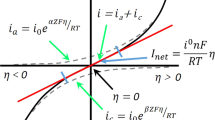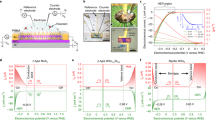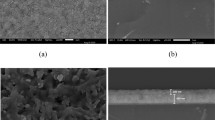Abstract
IT is a rather common occurrence that the resistance of semiconductor rectifiers drifts after application of a voltage. This effect is particularly strong immediately following the application of a voltage in the blocking direction. If the current decreases with time, one speaks of ‘forming’; if it increases, of ‘creep’. Forming and creep effects are particularly large in selenium rectifiers1. An explanation has been proposed2 based on the migration of ions in the barrier layer of the rectifier.
This is a preview of subscription content, access via your institution
Access options
Subscribe to this journal
Receive 51 print issues and online access
$199.00 per year
only $3.90 per issue
Buy this article
- Purchase on Springer Link
- Instant access to full article PDF
Prices may be subject to local taxes which are calculated during checkout
Similar content being viewed by others
References
Williams, A. L., and Thompson, L. E., J. Inst. Elect. Eng., 88, 353 (1941).
Rose, F., and Schmidt, H., Z. Naturforsch., 2 a, 226 (1947).
Lehovec, K., J. App. Phys., 20, 123 (1949).
Torrey, H. C., and Whitmer, C. A., “Crystal Rectifiers”, 100 (McGraw-Hill Book Co., New York, 1948).
Lehovec, K., Phys. Rev., 78, 348 (1950).
Author information
Authors and Affiliations
Rights and permissions
About this article
Cite this article
LEHOVEC, K. Origin of a Time-lag Effect in Selenium Rectifiers. Nature 167, 522–523 (1951). https://doi.org/10.1038/167522b0
Issue Date:
DOI: https://doi.org/10.1038/167522b0
Comments
By submitting a comment you agree to abide by our Terms and Community Guidelines. If you find something abusive or that does not comply with our terms or guidelines please flag it as inappropriate.



